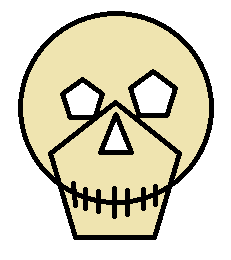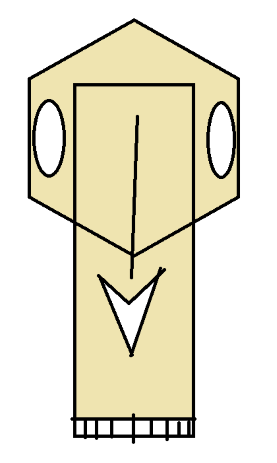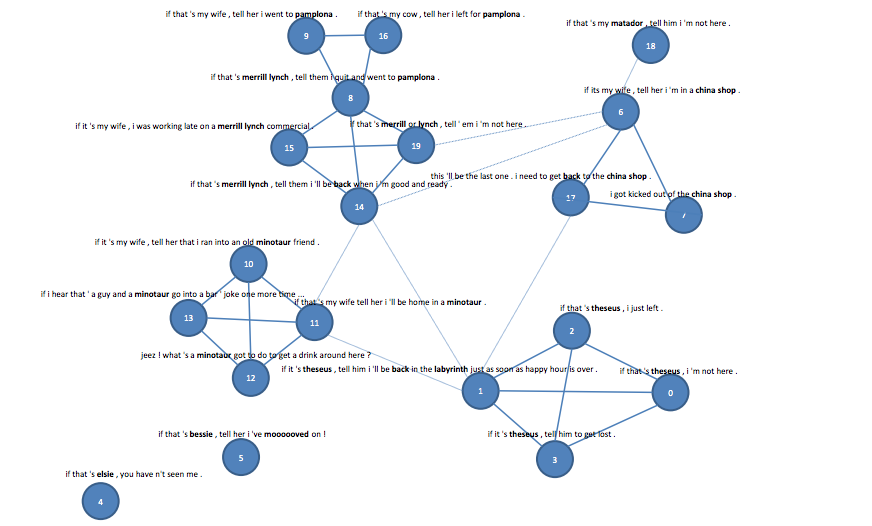What Links Here?
Outbound Links
Joke Genious
The secret source of humor itself is not joy but sorrow.
—Famous Smart Alec, Samuel Clemens
Explaining a joke can only ever make it funnier
Analyzing a joke is like dissecting a frog, in the end they both die.
—Woody Allen
I used to believe that jokes stopped being funny when they were analyzed. But since becoming a father I have undergone a radical transformation of my understanding of humour, and now realize that explaining a joke can only ever make it funnier.
A great idea for a website would be one that contains all of the jokes in existence, and along side them, the commentary that explains how they work and why they are funny.
I've looked into making such a site, and began to gather together an enormous collection of such jibery. But I froze, and stopped the endeavour as I realised that, taken all at once, surveyed minutely, analysed correctly most jokes are primarily harmful. Whether they are racist, sexist, classist, ageist, nationalist, or some other "ist"; they work by delineating an in-group (to which the audience belongs) and an out-group, the "butt" of the joke.
As an evolved feature of human social interaction the purpose of jokes and laughter is to draw a small band of people tighter, reinforcing the bonds between them and increasing their chances of defeating those deemed to be “other”, or “Irish”.
Here is an analysis of a joke.
Regardless, here is an analysis of a joke.
A horse walks into a bar. The bartender says "Why the long face?"
This joke is funny from beginning to end, and if you don't agree, I will persuade you now.
Let's take a look at this joke, word by word.
A horse
Already you are certain that this joke is going to be a good one.
Good jokes always have a great beginning. If a joke started with "A chair" then you would not be expecting very much. Jokes starting "a chair" have a very poor track record. I don't wish to be-labour this example, but there's almost no humour in chairs. Horses, on the other hand, are pretty much always good for a laugh.
Without pausing to derail this discussion at all, let me add that "A gorilla" would have been an even better start. Run a test for yourself - try telling just the first two words of a joke. As a control sample use "A chair..." and then for the experiment itself compare "A horse..." and "A gorilla..." -- you'll find the horse is good but the gorilla is great. Obviously with a different animal the progression of the joke would need to be altered, but this is a minor detail we can work out in post. A great start is what matters most. In any case, we're settling on horse, which is still a fine start to the proceedings.
Now the dangerous thing with a top quality start to a joke is that it has to follow through and keep the pace going. It's no good having people laugh at the first two words if they end up frowning by the end of the sentence. If we say, for example, "A horse was standing in a field -" it's very predictable and you will see the audience begin to drift away in ones and two. So let's see where this one is taking us.
A horse walks
WOW! What a development. The horse doesn't trot. It doesn't gallop. It doesn't even canter. It walks! Like a dude! What a horse! Where will this horse take us next!
A horse walks into a bar.
Damn! What kind of genius was capable of stringing together such a dynamite scene! Picture the bar, a regular saloon with oak and so on. An ordinary day. Maybe a fly buzzing around. A few quiet locals in the corner. Sunlight playing with particles of dust in the air. A little music tinkling out of a pianola roll perhaps. Not much happening. It's quiet is what I'm saying. KAPOW! The doors swing open and who should stroll in? Mr Horse! Nobody saw that coming, NOBODY, I guarantee you.
To summarize: I have not been to every bar in the world, but I can tell you one thing I have noticed about bars: horses don't tend to come strolling in.
Next minute:
The bartender says
TIME OUT! STOP THE CLOCK!
If you've ever met a bartender you can already guess what they're gonna say:
"Get out of here, horse! No horses! Hey, you with the steel feet, take a hike!"
Or some variation on the above.
But this bartender, whoah boy, no, here is a cool customer. Check this scene:
He doesn't shout. He doesn't even raise his voice, he "says". Says! That's his whole demeanor, that of a person speaking. This is not the expected response of a bar tender confronted by livestock in his place of business.
What then does he say?
He says:
Why the long face?
AH, his casual attitude is perhaps because he has failed to recognise that this patron is unlike any usual patron in the bar.
Perhaps our barkeep has an ocular deficiency. He has not observed anything unusual in this customer and he has used a customary psychological observation on the part of a barkeep, that of taking a counsellor's stance and preparing a shoulder on which the visitor can pour out all of his troubles in the world.
He is asking the new customer, "why are you sad?"
Okay, what happens next in the joke?
Nothing happens next. Wait up. That's it? That's the end?
Harumph! How odd!
This is the twist, you see. This is the surprise. A sudden end. Now the work falls upon us, upon you and me: the eager listeners. We must track backward a step in the chain of reasoning and see wherein we have faltered in our conclusion.
He has been confronted with a horse, and has enquired after the reason for any sadness he currently posseses.
Let's be more specific here.
He has said unto the horse:
Why.... why why....
Why?
Why the long...
Oh wait....
Why the long...
Ah!
Why the long FACE
HA!
Do you see!?
It occurs to us bit by bit, and then all in a rush.
The skeletal structure of the horse's cranium is typically elongated?!
The entendres are doubled!
At once this speech has two modes of interpretation.
It may, as we first thought, imply a question about well-being, but it may, equally, be an anatomical inquisition into the nature of horsey skulls!
Do you see?
Allow me to draw a diagram.
He is a normal customer in a bar:

Technically this is not a normal customer, this is the skull of a normal customer.
I draw this in order to bring your attention to the proportions of the height against the width. It is roughly the golden ratio, of 1.618033, or thereabouts.
Compare now a similar X-Ray of the equine cranium:

(These are not actual X-Rays, these are quickly sketched "Artist's Depictions" of an X-Ray and I apologise for their inexact nature)
Unless you are suffering some kind of Horse Blindness, you will observe without delay that the proportions are severely elongated.
We can thus reason that the bar-employee, having never observed a horse inside his establishment at any time prior to the moment encountered within the joke, compared said trotter, mentally, to a regular customer, noted the elongation and inquired after it.
Considering all this now, I am certain you are beginning to laugh.
As you have certainly witnessed, the analysis of jokes is a very powerful technique and gives tremendous enhancement to their enjoyment.
More about that horse
Ah, in late breaking news, I've received some more information about equine exploits in drinking dens. I'm told this by a reliable source:
A horse walks into a bar and orders a pint. The barkeep says "You're in here pretty often, do you think you might be an alcoholic?"
(Let's take a moment to appreciate the line, "you're in here pretty often" -- that is a kind of self-awareness about just how many jokes there are about the horse and the barkeep, and it hints that all such horse/barkeep jokes exist in a single congruent universe, a canonical HBU, rather than each being a kind of pocket universe, expressly conjured for the sake of the joke and immediately deflated into a liminal space afterwards)
The horse replies, "I don't think I am," and vanishes from existence.
Ah, now it should be readily apparent to the reader (or listener) that the horse has inverted philosopher Rene Descartes famous quip "I think therefore I am". Perhaps it would be best to introduce that before the joke, but that would be putting Descartes before the horse.
Further Analysis

I really like the above image, from the article "Gizmodo: Why are computers so bad at jokes".
Borat Voice
Here is a joke that I think rewards further study. And a retelling of a conversation I had, where I extracted the immense pleasure of explaining the joke.
(The people in this conversation are me (played by myself) and jack played by someone else.)
Jack: (nothing)
Jack: (absoluting nothing)
Me: Oh, you'll love this one.... (sends link to tweet)
Therapist: What's wrong?
— Jon (@ArfMeasures) April 30, 2018
Me: If I do the Borat voice once more, I'll be getting a divorce
Therapist: And who told you that?
Me: *tearfully clears throat*
Jack: I don’t get it. 🤷♂️ I mean, the fact that the therapist has to ask him who is odd, it's obviously his wife. Is that the joke? I don't get it.
me: Ah. Allow me to explain. You will enjoy this, because lengthy explanations always make jokes more enjoyable.
Jack: (appears doubtful)
me: He is about to say “my wife” but he is regretful to the point of tears, because he knows he is duty bound to answer the question truthfully, and yet he also knows that he cannot say it without habitually relapsing into his borat voice, and thus ensuring his own divorce from: https://m.youtube.com/watch?v=Zw16aew4Pt0
Jack: (nothing)
me:So it’s an inside joke that relies on you already being sick of people saying “mah wahfe” in borat voice. If you satisfy the prerequisites for the joke it is a very pleasing construction as it meticulously avoids saying the actual punchline. “In-jokes” are useful for reinforcing social bonds.
Jack: (nothing)
me: And this particular joke is a tremendous example of "making the person say the punchline inside their own head. It is like the famous use of "negative space" in the FedEx logo.
Jack: (still nothing)
me: (provides diagrams and lengthy explanation)
Jack: (absolutely nothing)
me: (puts together PowerPoint deck and continues at length)
Jack has left the conversation.
me: (continues at length)
me: (continues at length)
me: (continues at length)
me: (continues at length)
me: (continues at length)
Don't stop me if you've heard this
(Don't stop me if you've heard this.)
Many years ago, my dad told me that, many years before that, I mean, many years before the time at which he was telling me the story -- he, my father, was on a train with my mother, and they were headed to the beach. They were discussing the weather, both quite confident that, although it was cloudy at that moment, the clouds would clear away and they'd have a great day.
They were still discussing this when a stranger interrupted and, in a heavy Russian accent, he said, "Excuse me, I am sorry to interrupt, my name is Rudy, and I hear you talk about the clouds, you hope it clear up, but I tell you no, it will not clear up, it will come down in how you say? Dogs and cats? It will be the bucketing down." and with that Rudy left them alone.
"He's full of baloney," said my dad. But mum replied, "Let's see, I suspect he's right."
Just as they were stepping out of the train, the heavens opened and really let loose.
"I'm not surprised," said mum.
"Why's that?" asked dad.
And mum replied "Rudolph the Red knows rain, dear."
I was maybe six when I heard that, and every single concept in the joke had to be explained to me. I think that's what I love about it. I had no idea "Rudy" was short for "Rudolph". I had no idea that a "Russian" (at that time, this was pre 1989) could be referred to as a "Red", nor did I haven the faintest notion why this was so. And given that I heard the joke delivered orally, I had no idea that the sound "Nose Reindeer" was actually the words "Knows Rain, Dear." It just seemed like the reply was a surreal non-sequitur. I thought it was some mysterious code language, that my mum and dad used to speak to each other, before they had kids and stopped working as international spies1.
Further Study
See also
-
It's possible, isn't it? I mean, a kid like me, could have parents that are former international spies? Why not a kid like me??↩